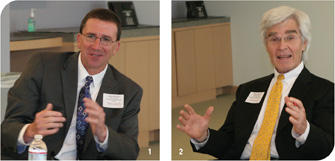
1. John Snyder’s opening question on how the economic downturn affected firms represented at the table produced some surprisingly optimistic responses. | 2. Pete Smith asked whether the need to maintain revenues had prompted other firms to explore offerings of legal services they previously hadn’t provided to clients.
What Recession?
As an opening question, participants were asked how the economic slowdown of the past five years had affected their practice. To a person, they responded positively.
“It has made both our lawyers and our professional staff more conscious of the things that make the long-term economically efficient,” said Mark Hinderks, managing partner of Stinson Morrison Hecker, voicing a common theme. “As a consequence, we’re able to provide better service to our clients at a pretty efficient price.”
In just about every law firm of size, some practice groups suffered. “We had, obviously, some practice groups that were slow. That’s not a big secret,” said Bob Keim, managing partner of Kutak Rock’s Kansas City office. At Kutak Rock, as just about everywhere, bond transactions slowed down.
Roger Warren, of Sanders Warren & Russell, cited the fallout from problems experienced by mid-size and smaller construction companies, some of which had simply disappeared.
Bob Fisher, a partner at Dentons, noted that middle-market mergers and acquisitions and other private equity transactions suffered somewhat because of financing issues, but at Dentons, as at all the firms assembled, these slowdowns were more than offset by growth in other areas.
Kutak Rock saw an increased business in workouts and slow debts. McDowell Rice, as Jon Margolies pointed out, has always had a significant concentration of its practice in debtor-creditor areas, corporate bankruptcy and litigation. “During the economic downturn, our business thrived,” said Margolies.
Kansas City firms benefitted as well from what John Granda, chairman of Stinson’s corporate finance division, calls “the value proposition.” Said Granda, “There has always been a glass ceiling for Kansas City-type firms.” Much of the work they have historically competed for has gone to Wall Street. With corporations monitoring their bottom lines more closely, Kansas City firms became more attractive not just for their favorable rates, but levels of service.
Trip Frizell, head of the general corporate group at Polsinelli, confirmed Granda’s observations about KC’s value proposition. “We’ve seen tremendous growth in the larger city marketplaces that we’re in,” he said.
Kansas City firms not only secured new business that had been previously out of reach, but they also recruited new employees. “Talent that we hadn’t really seen in nine or 10 years because of the salary gap came knocking on our door,” observed Patrick Whalen, chairman at Spencer Fane Britt & Browne.
Just about every firm reported a general belt-tightening and an emphasis on efficiency that has served them well as the economic pressures eased. “We had to be much more disciplined in how we managed ourselves,” said Steve Carman, chair of the corporate department at Husch Blackwell. “As a result, we’ve come through the experience having learned those lessons, and we’re much better off and ready for things to start to pick up.”
The firms’ clients appear to have benefitted from the experience as well. During the downturn, “Client service meant more than anything,” said Tom Stahl, a partner at Lathrop & Gage. “There was also pressure on rates. You really had to give clients the bang for their buck.”
“We had the opportunity to show our clients what partners we could be,” said Jay Selanders, head of corporate department at Kutak Rock. “As a result, we gained a lot of trust and a lot of loyalty.”
Larry Frazen, managing partner of Bryan Cave, cited as a lasting benefit the focus on practice economics, especially as it related to client relationships. The firm addressed alternative fees, a departure from hourly rates, and ways the firm’s attorneys could deliver their services “in a way that really partners with our clients economically.”
Armstrong Teasdale did much the same, and the clients noticed. “I think a lot of clients have been very appreciative that we did work with them and try to find value in the way that we can provide services during a downturn,” said Scott Long, head of the firm’s business practice group in the Kansas City office.
“I think what we learned was the importance of getting close to our clients,” said Joe Hiersteiner, managing director of the firm now known as Seigfreid Bingham, P.C. For his firm, getting close to clients meant in some cases coming up with alternative fees or, at least, alternative collection arrangements.
“By being sensitive to those client struggles,” said Hiersteiner, “I think we’ve come out of that with relationships that are much stronger than they were before.”
Corporate Transactions
Among the areas most affected by economic events of the past five years were corporate transactions. John Snyder quizzed his colleagues on whether financing had picked up and, if so, to what degree.